Mental Illness: A Study of Nursing Student Perceptions in Saudi Arabia
VerifiedAdded on 2023/06/03
|8
|1976
|106
Report
AI Summary
This report investigates the opinions and attitudes of nursing students in Saudi Arabia towards mental illness, highlighting the varying perspectives ranging from positive to negative. It delves into factors influencing these attitudes, including personal experiences with mental illness, education, and social stigmas affecting both patients and healthcare providers. The study identifies inadequate resources and continuous training as key challenges in mental health nursing. The conclusion emphasizes the importance of promoting positive clinical experiences and collaborative efforts to improve nursing students' perceptions of mental illness, ultimately impacting their future career choices and the quality of care provided. Desklib offers similar resources for students.
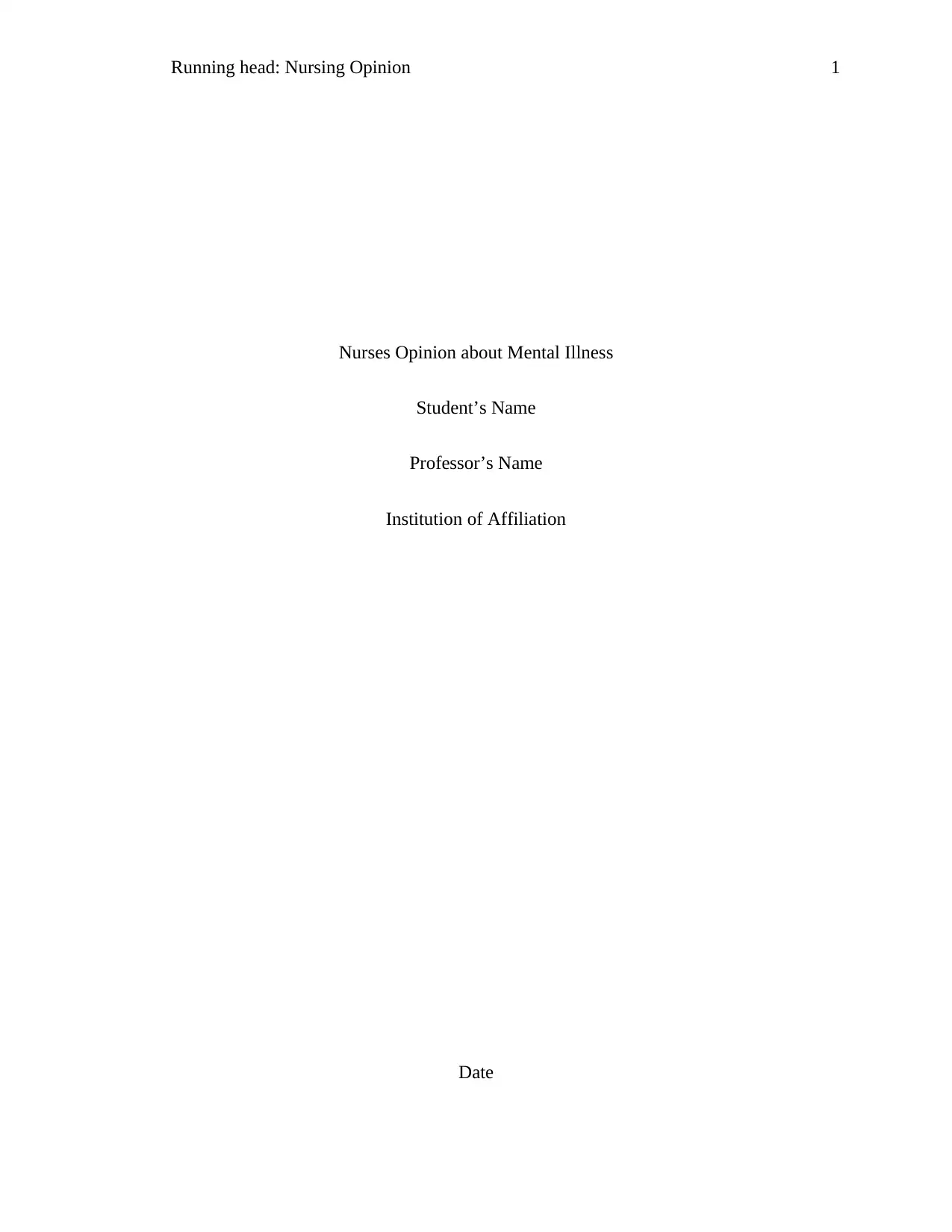
Running head: Nursing Opinion 1
Nurses Opinion about Mental Illness
Student’s Name
Professor’s Name
Institution of Affiliation
Date
Nurses Opinion about Mental Illness
Student’s Name
Professor’s Name
Institution of Affiliation
Date
Paraphrase This Document
Need a fresh take? Get an instant paraphrase of this document with our AI Paraphraser
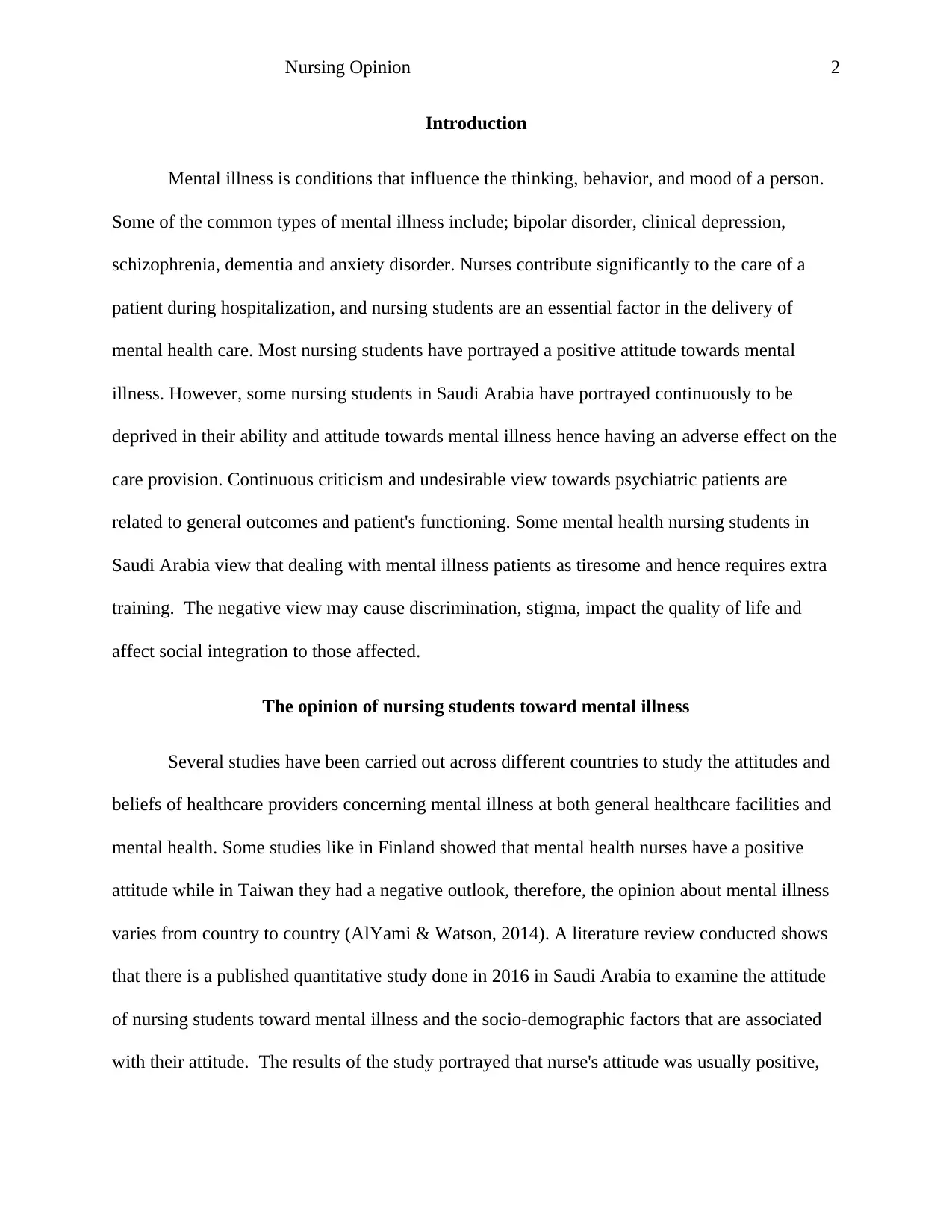
Nursing Opinion 2
Introduction
Mental illness is conditions that influence the thinking, behavior, and mood of a person.
Some of the common types of mental illness include; bipolar disorder, clinical depression,
schizophrenia, dementia and anxiety disorder. Nurses contribute significantly to the care of a
patient during hospitalization, and nursing students are an essential factor in the delivery of
mental health care. Most nursing students have portrayed a positive attitude towards mental
illness. However, some nursing students in Saudi Arabia have portrayed continuously to be
deprived in their ability and attitude towards mental illness hence having an adverse effect on the
care provision. Continuous criticism and undesirable view towards psychiatric patients are
related to general outcomes and patient's functioning. Some mental health nursing students in
Saudi Arabia view that dealing with mental illness patients as tiresome and hence requires extra
training. The negative view may cause discrimination, stigma, impact the quality of life and
affect social integration to those affected.
The opinion of nursing students toward mental illness
Several studies have been carried out across different countries to study the attitudes and
beliefs of healthcare providers concerning mental illness at both general healthcare facilities and
mental health. Some studies like in Finland showed that mental health nurses have a positive
attitude while in Taiwan they had a negative outlook, therefore, the opinion about mental illness
varies from country to country (AlYami & Watson, 2014). A literature review conducted shows
that there is a published quantitative study done in 2016 in Saudi Arabia to examine the attitude
of nursing students toward mental illness and the socio-demographic factors that are associated
with their attitude. The results of the study portrayed that nurse's attitude was usually positive,
Introduction
Mental illness is conditions that influence the thinking, behavior, and mood of a person.
Some of the common types of mental illness include; bipolar disorder, clinical depression,
schizophrenia, dementia and anxiety disorder. Nurses contribute significantly to the care of a
patient during hospitalization, and nursing students are an essential factor in the delivery of
mental health care. Most nursing students have portrayed a positive attitude towards mental
illness. However, some nursing students in Saudi Arabia have portrayed continuously to be
deprived in their ability and attitude towards mental illness hence having an adverse effect on the
care provision. Continuous criticism and undesirable view towards psychiatric patients are
related to general outcomes and patient's functioning. Some mental health nursing students in
Saudi Arabia view that dealing with mental illness patients as tiresome and hence requires extra
training. The negative view may cause discrimination, stigma, impact the quality of life and
affect social integration to those affected.
The opinion of nursing students toward mental illness
Several studies have been carried out across different countries to study the attitudes and
beliefs of healthcare providers concerning mental illness at both general healthcare facilities and
mental health. Some studies like in Finland showed that mental health nurses have a positive
attitude while in Taiwan they had a negative outlook, therefore, the opinion about mental illness
varies from country to country (AlYami & Watson, 2014). A literature review conducted shows
that there is a published quantitative study done in 2016 in Saudi Arabia to examine the attitude
of nursing students toward mental illness and the socio-demographic factors that are associated
with their attitude. The results of the study portrayed that nurse's attitude was usually positive,
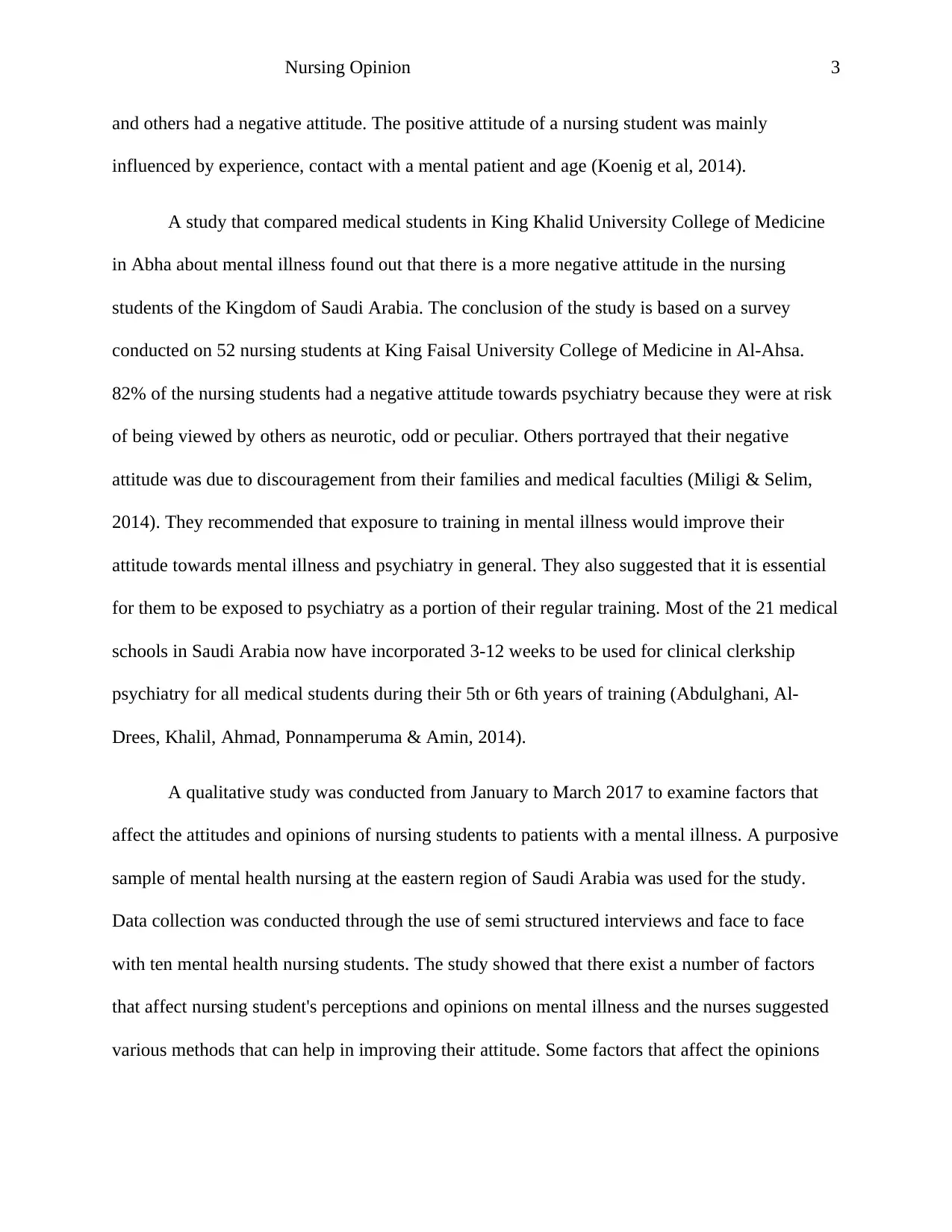
Nursing Opinion 3
and others had a negative attitude. The positive attitude of a nursing student was mainly
influenced by experience, contact with a mental patient and age (Koenig et al, 2014).
A study that compared medical students in King Khalid University College of Medicine
in Abha about mental illness found out that there is a more negative attitude in the nursing
students of the Kingdom of Saudi Arabia. The conclusion of the study is based on a survey
conducted on 52 nursing students at King Faisal University College of Medicine in Al-Ahsa.
82% of the nursing students had a negative attitude towards psychiatry because they were at risk
of being viewed by others as neurotic, odd or peculiar. Others portrayed that their negative
attitude was due to discouragement from their families and medical faculties (Miligi & Selim,
2014). They recommended that exposure to training in mental illness would improve their
attitude towards mental illness and psychiatry in general. They also suggested that it is essential
for them to be exposed to psychiatry as a portion of their regular training. Most of the 21 medical
schools in Saudi Arabia now have incorporated 3-12 weeks to be used for clinical clerkship
psychiatry for all medical students during their 5th or 6th years of training (Abdulghani, Al-
Drees, Khalil, Ahmad, Ponnamperuma & Amin, 2014).
A qualitative study was conducted from January to March 2017 to examine factors that
affect the attitudes and opinions of nursing students to patients with a mental illness. A purposive
sample of mental health nursing at the eastern region of Saudi Arabia was used for the study.
Data collection was conducted through the use of semi structured interviews and face to face
with ten mental health nursing students. The study showed that there exist a number of factors
that affect nursing student's perceptions and opinions on mental illness and the nurses suggested
various methods that can help in improving their attitude. Some factors that affect the opinions
and others had a negative attitude. The positive attitude of a nursing student was mainly
influenced by experience, contact with a mental patient and age (Koenig et al, 2014).
A study that compared medical students in King Khalid University College of Medicine
in Abha about mental illness found out that there is a more negative attitude in the nursing
students of the Kingdom of Saudi Arabia. The conclusion of the study is based on a survey
conducted on 52 nursing students at King Faisal University College of Medicine in Al-Ahsa.
82% of the nursing students had a negative attitude towards psychiatry because they were at risk
of being viewed by others as neurotic, odd or peculiar. Others portrayed that their negative
attitude was due to discouragement from their families and medical faculties (Miligi & Selim,
2014). They recommended that exposure to training in mental illness would improve their
attitude towards mental illness and psychiatry in general. They also suggested that it is essential
for them to be exposed to psychiatry as a portion of their regular training. Most of the 21 medical
schools in Saudi Arabia now have incorporated 3-12 weeks to be used for clinical clerkship
psychiatry for all medical students during their 5th or 6th years of training (Abdulghani, Al-
Drees, Khalil, Ahmad, Ponnamperuma & Amin, 2014).
A qualitative study was conducted from January to March 2017 to examine factors that
affect the attitudes and opinions of nursing students to patients with a mental illness. A purposive
sample of mental health nursing at the eastern region of Saudi Arabia was used for the study.
Data collection was conducted through the use of semi structured interviews and face to face
with ten mental health nursing students. The study showed that there exist a number of factors
that affect nursing student's perceptions and opinions on mental illness and the nurses suggested
various methods that can help in improving their attitude. Some factors that affect the opinions
⊘ This is a preview!⊘
Do you want full access?
Subscribe today to unlock all pages.

Trusted by 1+ million students worldwide
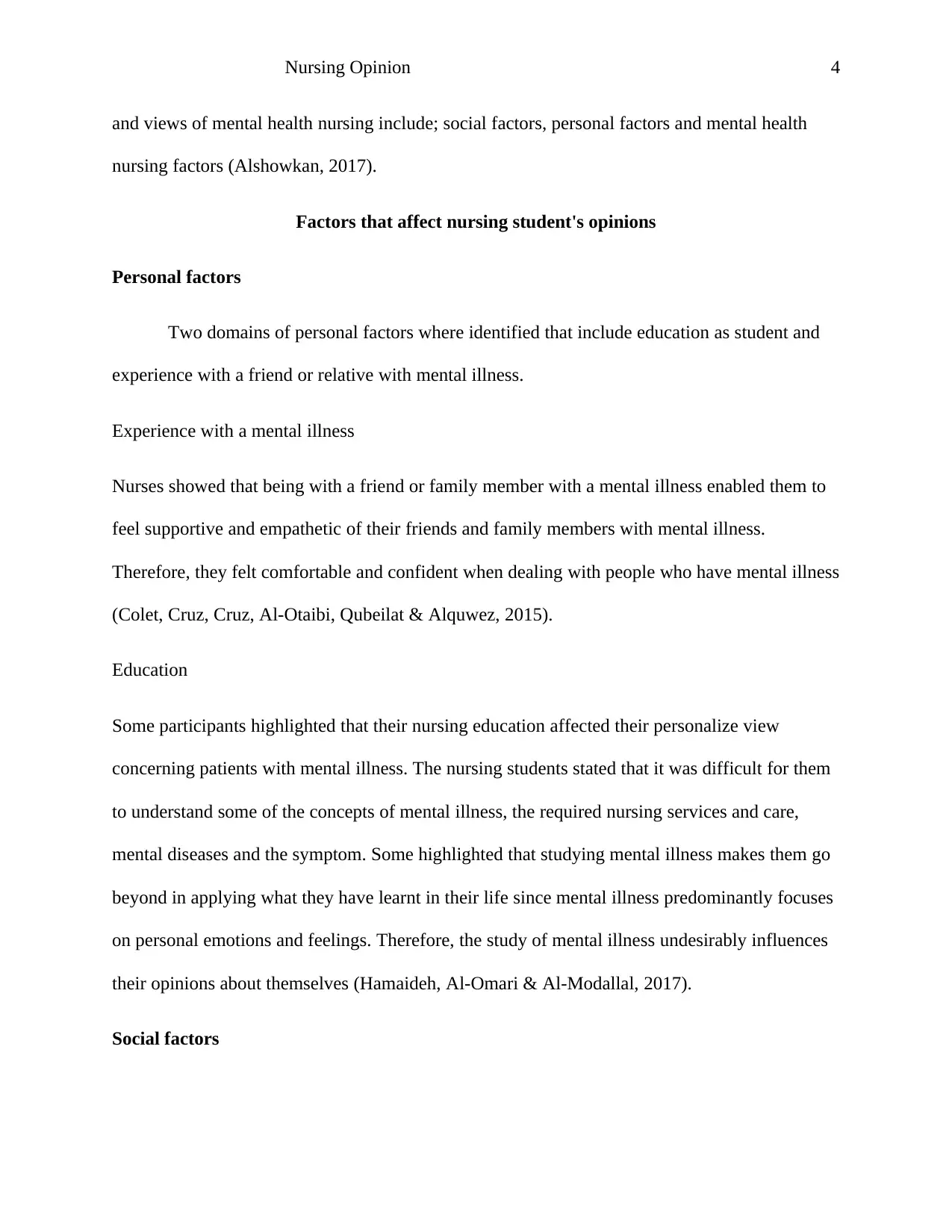
Nursing Opinion 4
and views of mental health nursing include; social factors, personal factors and mental health
nursing factors (Alshowkan, 2017).
Factors that affect nursing student's opinions
Personal factors
Two domains of personal factors where identified that include education as student and
experience with a friend or relative with mental illness.
Experience with a mental illness
Nurses showed that being with a friend or family member with a mental illness enabled them to
feel supportive and empathetic of their friends and family members with mental illness.
Therefore, they felt comfortable and confident when dealing with people who have mental illness
(Colet, Cruz, Cruz, Al-Otaibi, Qubeilat & Alquwez, 2015).
Education
Some participants highlighted that their nursing education affected their personalize view
concerning patients with mental illness. The nursing students stated that it was difficult for them
to understand some of the concepts of mental illness, the required nursing services and care,
mental diseases and the symptom. Some highlighted that studying mental illness makes them go
beyond in applying what they have learnt in their life since mental illness predominantly focuses
on personal emotions and feelings. Therefore, the study of mental illness undesirably influences
their opinions about themselves (Hamaideh, Al-Omari & Al-Modallal, 2017).
Social factors
and views of mental health nursing include; social factors, personal factors and mental health
nursing factors (Alshowkan, 2017).
Factors that affect nursing student's opinions
Personal factors
Two domains of personal factors where identified that include education as student and
experience with a friend or relative with mental illness.
Experience with a mental illness
Nurses showed that being with a friend or family member with a mental illness enabled them to
feel supportive and empathetic of their friends and family members with mental illness.
Therefore, they felt comfortable and confident when dealing with people who have mental illness
(Colet, Cruz, Cruz, Al-Otaibi, Qubeilat & Alquwez, 2015).
Education
Some participants highlighted that their nursing education affected their personalize view
concerning patients with mental illness. The nursing students stated that it was difficult for them
to understand some of the concepts of mental illness, the required nursing services and care,
mental diseases and the symptom. Some highlighted that studying mental illness makes them go
beyond in applying what they have learnt in their life since mental illness predominantly focuses
on personal emotions and feelings. Therefore, the study of mental illness undesirably influences
their opinions about themselves (Hamaideh, Al-Omari & Al-Modallal, 2017).
Social factors
Paraphrase This Document
Need a fresh take? Get an instant paraphrase of this document with our AI Paraphraser
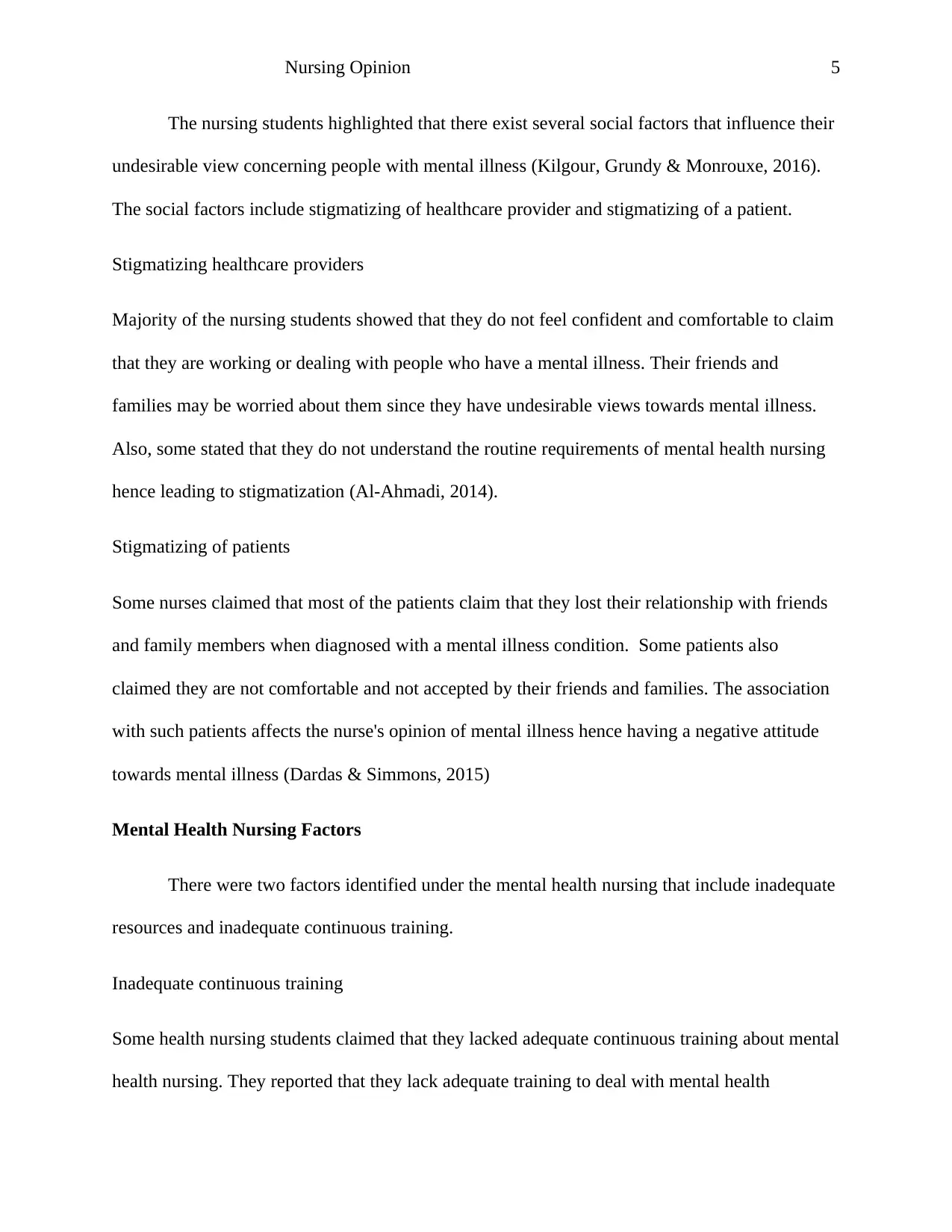
Nursing Opinion 5
The nursing students highlighted that there exist several social factors that influence their
undesirable view concerning people with mental illness (Kilgour, Grundy & Monrouxe, 2016).
The social factors include stigmatizing of healthcare provider and stigmatizing of a patient.
Stigmatizing healthcare providers
Majority of the nursing students showed that they do not feel confident and comfortable to claim
that they are working or dealing with people who have a mental illness. Their friends and
families may be worried about them since they have undesirable views towards mental illness.
Also, some stated that they do not understand the routine requirements of mental health nursing
hence leading to stigmatization (Al-Ahmadi, 2014).
Stigmatizing of patients
Some nurses claimed that most of the patients claim that they lost their relationship with friends
and family members when diagnosed with a mental illness condition. Some patients also
claimed they are not comfortable and not accepted by their friends and families. The association
with such patients affects the nurse's opinion of mental illness hence having a negative attitude
towards mental illness (Dardas & Simmons, 2015)
Mental Health Nursing Factors
There were two factors identified under the mental health nursing that include inadequate
resources and inadequate continuous training.
Inadequate continuous training
Some health nursing students claimed that they lacked adequate continuous training about mental
health nursing. They reported that they lack adequate training to deal with mental health
The nursing students highlighted that there exist several social factors that influence their
undesirable view concerning people with mental illness (Kilgour, Grundy & Monrouxe, 2016).
The social factors include stigmatizing of healthcare provider and stigmatizing of a patient.
Stigmatizing healthcare providers
Majority of the nursing students showed that they do not feel confident and comfortable to claim
that they are working or dealing with people who have a mental illness. Their friends and
families may be worried about them since they have undesirable views towards mental illness.
Also, some stated that they do not understand the routine requirements of mental health nursing
hence leading to stigmatization (Al-Ahmadi, 2014).
Stigmatizing of patients
Some nurses claimed that most of the patients claim that they lost their relationship with friends
and family members when diagnosed with a mental illness condition. Some patients also
claimed they are not comfortable and not accepted by their friends and families. The association
with such patients affects the nurse's opinion of mental illness hence having a negative attitude
towards mental illness (Dardas & Simmons, 2015)
Mental Health Nursing Factors
There were two factors identified under the mental health nursing that include inadequate
resources and inadequate continuous training.
Inadequate continuous training
Some health nursing students claimed that they lacked adequate continuous training about mental
health nursing. They reported that they lack adequate training to deal with mental health
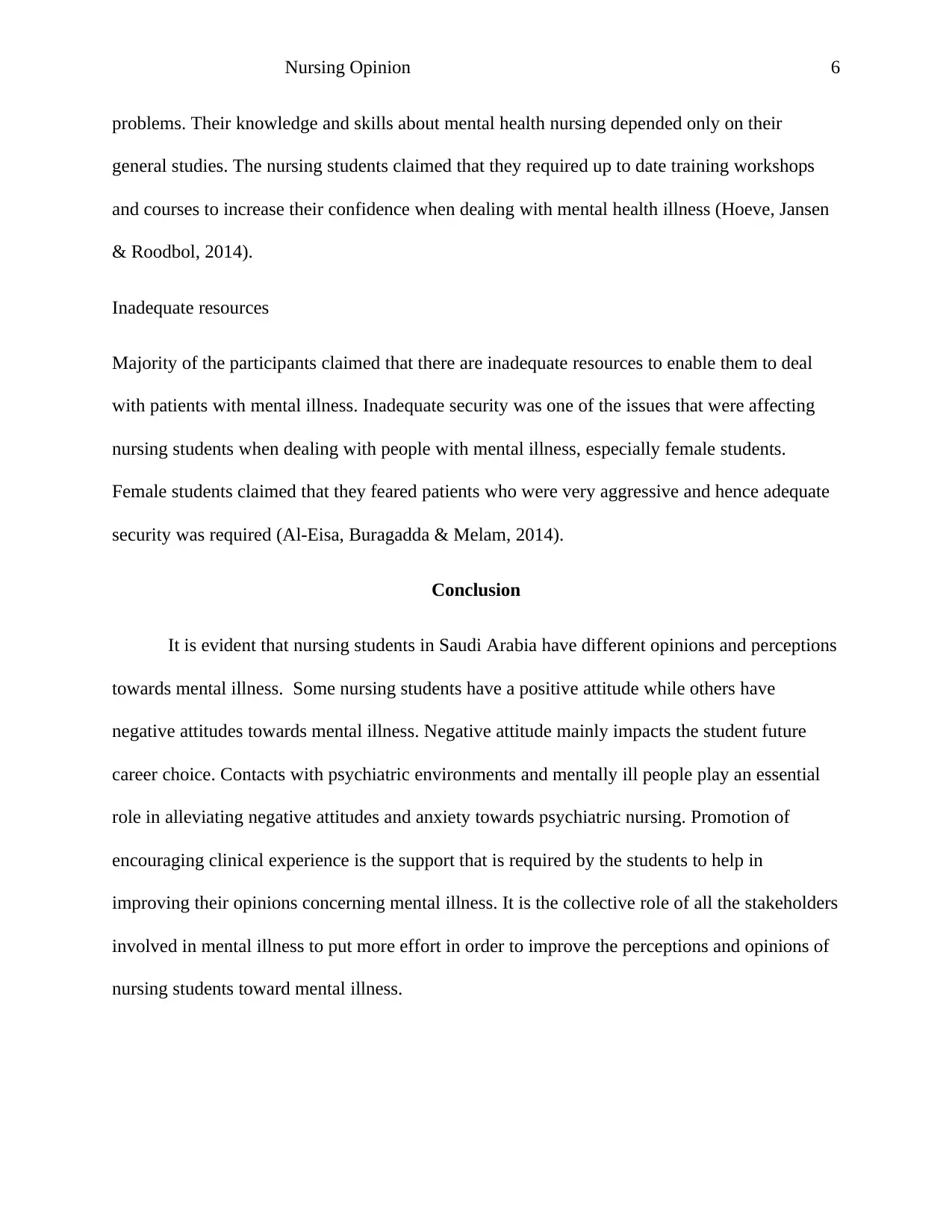
Nursing Opinion 6
problems. Their knowledge and skills about mental health nursing depended only on their
general studies. The nursing students claimed that they required up to date training workshops
and courses to increase their confidence when dealing with mental health illness (Hoeve, Jansen
& Roodbol, 2014).
Inadequate resources
Majority of the participants claimed that there are inadequate resources to enable them to deal
with patients with mental illness. Inadequate security was one of the issues that were affecting
nursing students when dealing with people with mental illness, especially female students.
Female students claimed that they feared patients who were very aggressive and hence adequate
security was required (Al-Eisa, Buragadda & Melam, 2014).
Conclusion
It is evident that nursing students in Saudi Arabia have different opinions and perceptions
towards mental illness. Some nursing students have a positive attitude while others have
negative attitudes towards mental illness. Negative attitude mainly impacts the student future
career choice. Contacts with psychiatric environments and mentally ill people play an essential
role in alleviating negative attitudes and anxiety towards psychiatric nursing. Promotion of
encouraging clinical experience is the support that is required by the students to help in
improving their opinions concerning mental illness. It is the collective role of all the stakeholders
involved in mental illness to put more effort in order to improve the perceptions and opinions of
nursing students toward mental illness.
problems. Their knowledge and skills about mental health nursing depended only on their
general studies. The nursing students claimed that they required up to date training workshops
and courses to increase their confidence when dealing with mental health illness (Hoeve, Jansen
& Roodbol, 2014).
Inadequate resources
Majority of the participants claimed that there are inadequate resources to enable them to deal
with patients with mental illness. Inadequate security was one of the issues that were affecting
nursing students when dealing with people with mental illness, especially female students.
Female students claimed that they feared patients who were very aggressive and hence adequate
security was required (Al-Eisa, Buragadda & Melam, 2014).
Conclusion
It is evident that nursing students in Saudi Arabia have different opinions and perceptions
towards mental illness. Some nursing students have a positive attitude while others have
negative attitudes towards mental illness. Negative attitude mainly impacts the student future
career choice. Contacts with psychiatric environments and mentally ill people play an essential
role in alleviating negative attitudes and anxiety towards psychiatric nursing. Promotion of
encouraging clinical experience is the support that is required by the students to help in
improving their opinions concerning mental illness. It is the collective role of all the stakeholders
involved in mental illness to put more effort in order to improve the perceptions and opinions of
nursing students toward mental illness.
⊘ This is a preview!⊘
Do you want full access?
Subscribe today to unlock all pages.

Trusted by 1+ million students worldwide
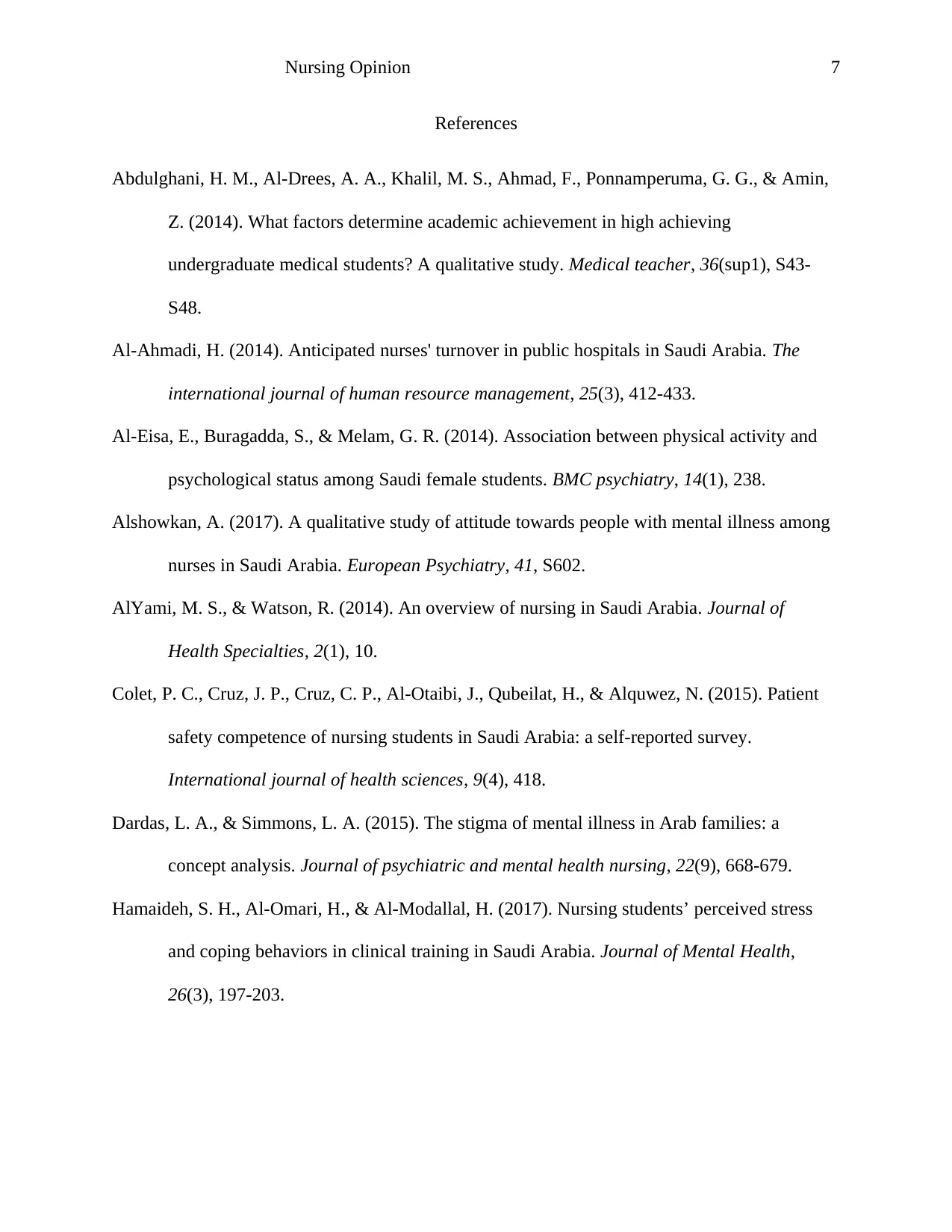
Nursing Opinion 7
References
Abdulghani, H. M., Al-Drees, A. A., Khalil, M. S., Ahmad, F., Ponnamperuma, G. G., & Amin,
Z. (2014). What factors determine academic achievement in high achieving
undergraduate medical students? A qualitative study. Medical teacher, 36(sup1), S43-
S48.
Al-Ahmadi, H. (2014). Anticipated nurses' turnover in public hospitals in Saudi Arabia. The
international journal of human resource management, 25(3), 412-433.
Al-Eisa, E., Buragadda, S., & Melam, G. R. (2014). Association between physical activity and
psychological status among Saudi female students. BMC psychiatry, 14(1), 238.
Alshowkan, A. (2017). A qualitative study of attitude towards people with mental illness among
nurses in Saudi Arabia. European Psychiatry, 41, S602.
AlYami, M. S., & Watson, R. (2014). An overview of nursing in Saudi Arabia. Journal of
Health Specialties, 2(1), 10.
Colet, P. C., Cruz, J. P., Cruz, C. P., Al-Otaibi, J., Qubeilat, H., & Alquwez, N. (2015). Patient
safety competence of nursing students in Saudi Arabia: a self-reported survey.
International journal of health sciences, 9(4), 418.
Dardas, L. A., & Simmons, L. A. (2015). The stigma of mental illness in Arab families: a
concept analysis. Journal of psychiatric and mental health nursing, 22(9), 668-679.
Hamaideh, S. H., Al-Omari, H., & Al-Modallal, H. (2017). Nursing students’ perceived stress
and coping behaviors in clinical training in Saudi Arabia. Journal of Mental Health,
26(3), 197-203.
References
Abdulghani, H. M., Al-Drees, A. A., Khalil, M. S., Ahmad, F., Ponnamperuma, G. G., & Amin,
Z. (2014). What factors determine academic achievement in high achieving
undergraduate medical students? A qualitative study. Medical teacher, 36(sup1), S43-
S48.
Al-Ahmadi, H. (2014). Anticipated nurses' turnover in public hospitals in Saudi Arabia. The
international journal of human resource management, 25(3), 412-433.
Al-Eisa, E., Buragadda, S., & Melam, G. R. (2014). Association between physical activity and
psychological status among Saudi female students. BMC psychiatry, 14(1), 238.
Alshowkan, A. (2017). A qualitative study of attitude towards people with mental illness among
nurses in Saudi Arabia. European Psychiatry, 41, S602.
AlYami, M. S., & Watson, R. (2014). An overview of nursing in Saudi Arabia. Journal of
Health Specialties, 2(1), 10.
Colet, P. C., Cruz, J. P., Cruz, C. P., Al-Otaibi, J., Qubeilat, H., & Alquwez, N. (2015). Patient
safety competence of nursing students in Saudi Arabia: a self-reported survey.
International journal of health sciences, 9(4), 418.
Dardas, L. A., & Simmons, L. A. (2015). The stigma of mental illness in Arab families: a
concept analysis. Journal of psychiatric and mental health nursing, 22(9), 668-679.
Hamaideh, S. H., Al-Omari, H., & Al-Modallal, H. (2017). Nursing students’ perceived stress
and coping behaviors in clinical training in Saudi Arabia. Journal of Mental Health,
26(3), 197-203.
Paraphrase This Document
Need a fresh take? Get an instant paraphrase of this document with our AI Paraphraser
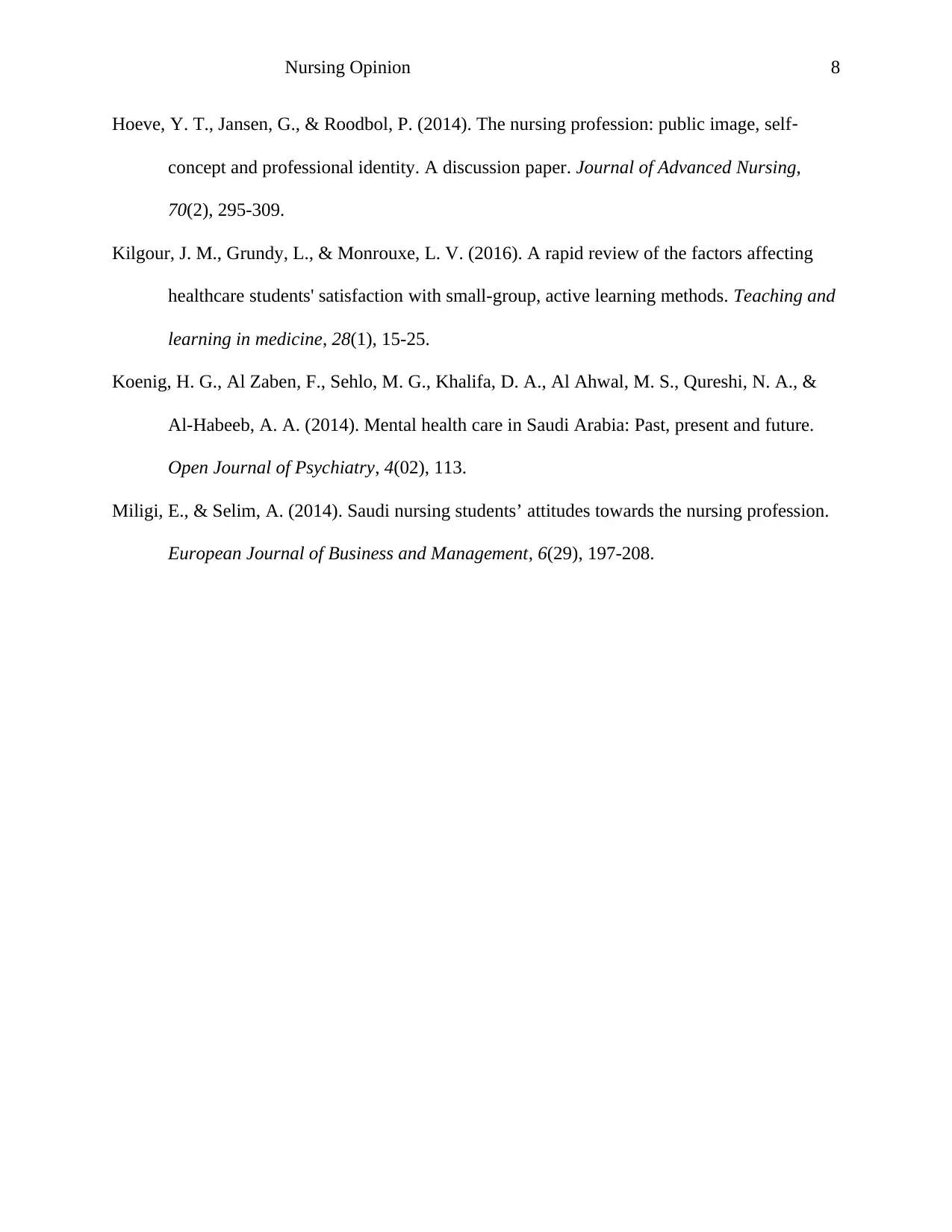
Nursing Opinion 8
Hoeve, Y. T., Jansen, G., & Roodbol, P. (2014). The nursing profession: public image, self‐
concept and professional identity. A discussion paper. Journal of Advanced Nursing,
70(2), 295-309.
Kilgour, J. M., Grundy, L., & Monrouxe, L. V. (2016). A rapid review of the factors affecting
healthcare students' satisfaction with small-group, active learning methods. Teaching and
learning in medicine, 28(1), 15-25.
Koenig, H. G., Al Zaben, F., Sehlo, M. G., Khalifa, D. A., Al Ahwal, M. S., Qureshi, N. A., &
Al-Habeeb, A. A. (2014). Mental health care in Saudi Arabia: Past, present and future.
Open Journal of Psychiatry, 4(02), 113.
Miligi, E., & Selim, A. (2014). Saudi nursing students’ attitudes towards the nursing profession.
European Journal of Business and Management, 6(29), 197-208.
Hoeve, Y. T., Jansen, G., & Roodbol, P. (2014). The nursing profession: public image, self‐
concept and professional identity. A discussion paper. Journal of Advanced Nursing,
70(2), 295-309.
Kilgour, J. M., Grundy, L., & Monrouxe, L. V. (2016). A rapid review of the factors affecting
healthcare students' satisfaction with small-group, active learning methods. Teaching and
learning in medicine, 28(1), 15-25.
Koenig, H. G., Al Zaben, F., Sehlo, M. G., Khalifa, D. A., Al Ahwal, M. S., Qureshi, N. A., &
Al-Habeeb, A. A. (2014). Mental health care in Saudi Arabia: Past, present and future.
Open Journal of Psychiatry, 4(02), 113.
Miligi, E., & Selim, A. (2014). Saudi nursing students’ attitudes towards the nursing profession.
European Journal of Business and Management, 6(29), 197-208.
1 out of 8
Related Documents
Your All-in-One AI-Powered Toolkit for Academic Success.
+13062052269
info@desklib.com
Available 24*7 on WhatsApp / Email
![[object Object]](/_next/static/media/star-bottom.7253800d.svg)
Unlock your academic potential
Copyright © 2020–2025 A2Z Services. All Rights Reserved. Developed and managed by ZUCOL.





